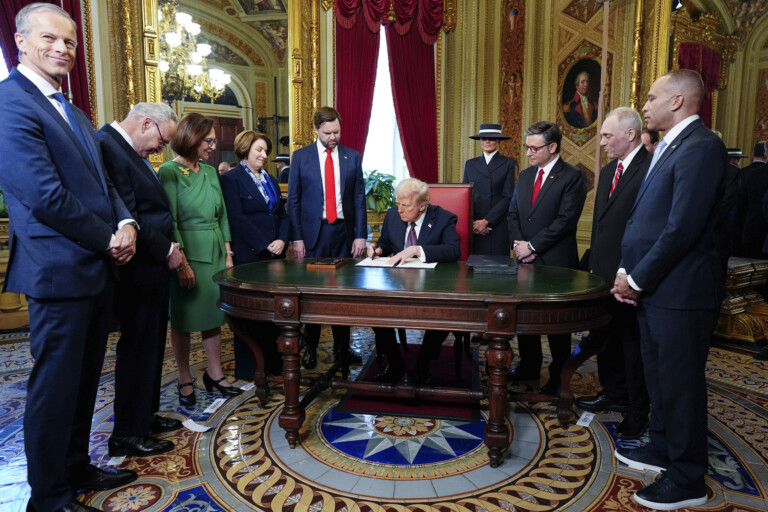Inauguration Day Latest: Trump issues pardons for Jan. 6 rioters and signs more executive actions

WASHINGTON (AP) — Donald Trump, who overcame impeachments, criminal indictments and a pair of assassination attempts to win another term in the White House, was sworn in Monday as the 47th U.S. president, taking charge as Republicans claim unified control of Washington and set out to reshape the country’s institutions.
Trump’s swearing-in ceremony moved indoors due to intense cold. After being inaugurated, he attended a parade in his honor at Capital One Arena and signed a number of executive orders and pardons for his supporters who stormed the U.S. Capitol on Jan. 6, 2021.
Here’s the latest:
Trump signs order halting offshore wind expansion
Trump signed an executive order halting offshore wind lease sales and pausing the issuance of approvals, permits and loans for onshore and offshore wind projects.
Trump’s order says the interior secretary will review federal wind leasing and permitting practices. The assessment will consider the environmental impact of onshore and offshore wind projects, the economic costs associated with the intermittent generation of electricity and the effect of subsidies on the viability of the wind industry, the order states.
Trump wants to increase drilling for oil and gas and has been hostile to renewable energy, particularly offshore wind.
Taiwanese president congratulates Trump and Vance
Taiwanese President Lai Ching-te congratulated Trump and Vance on their inauguration in a message on the social platform X.
“Taiwan looks forward to working with your administration to promote enduring freedom, peace & prosperity around the world,” the statement read. “We wish you great success in the years ahead.”
The U.S. is Taiwan’s largest unofficial backer and arms provider. The government in Taipei hopes the Trump administration will continue to offer its support in the face of annexation threats from China, which considers the self-ruled island its own territory and threatens to take it over, by force if necessary.
Trump directs attorney general to help states get lethal injection drugs
Trump has signed a sweeping execution order on the death penalty, directing the attorney general to “take all necessary and lawful action” to ensure that states have enough lethal injection drugs to carry out executions.
Trump wrote that “politicians and judges who oppose capital punishment have defied and subverted the laws of our country.”
A moratorium on federal executions had been in place since 2021, and only three defendants remain on federal death row after Biden converted 37 of their sentences to life in prison.
▶ Read more about Trump’s death penalty order
Trump is not confident ceasefire in Gaza will hold
Trump said Hamas is weakened, but he’s hardly certain that the temporary truce between Israel and Hamas will hold.
“I’m not confident,” Trump told reporters. “That’s not our war. It’s their war.”
He said his administration “might” help rebuild Gaza, which he compared to a “massive demolition site.”
“Some beautiful things could be done with it,” said Trump, the real estate developer turned commander in chief, noting the territory’s coastline and “phenomenal” weather and location. “Some fantastic things could be done with Gaza. Some beautiful things could be done with Gaza.”
Trump suspends US foreign assistance for 90 days pending reviews
Trump has signed an executive order temporarily suspending all U.S. foreign assistance programs for 90 days pending reviews to determine whether they are aligned with his policy goals.
It was not immediately clear how much assistance would be initially affected by the order. Funding for many programs has already been appropriated by Congress and obligated to be spent, if not already spent.
Republicans want local police to cooperate with immigration authorities
The majority of U.S. adults think local police in their community should cooperate with federal immigration authorities to deport people who are in the country illegally at least some of the time, according to a January AP-NORC poll. Americans are more likely to say cooperation should happen in some cases but not others than they are to support cooperation across the board.
About 4 in 10 Americans say local police “should always cooperate,” and about half say they “should cooperate in some cases.” Only about 1 in 10 say the local police in their community should never cooperate in these circumstances.
Republicans are especially likely to want cooperation all of the time. About two-thirds of Republicans say local police should always cooperate. Only about one-third of independents and one-quarter of Democrats agree.
Trump immigration order restores 2017 deportation criteria
One of Trump’s more impactful orders on immigration simply restores what was in place when he took office in 2017.
Trump wants to end federal grants to “sanctuary” jurisdictions, or state and local governments that limit cooperation with immigration authorities. The White House maintains that sanctuaries are breaking a law that forbids interfering with federal law enforcement officers.
He also wants negotiations with state and local governments to deputize local police to enforce immigration laws, known as 287(g) agreements after a section of a 1996 immigration law.
The order restores deportation criteria to pursue everyone in the country illegally, not just those with serious criminal records, those deemed national security or public safety threats, and those who recently crossed the border.
Congressional Republican leaders are heading to the White House
House Speaker Mike Johnson and Senate Majority Leader John Thune are tentatively heading to the White House on Tuesday to meet with Trump.
That’s according to a person familiar with the plans who spoke on condition of anonymity to discuss them. The plans were first reported by Axios.
It’s not clear if other Republican leaders are joining for what is expected to be an afternoon meeting.






